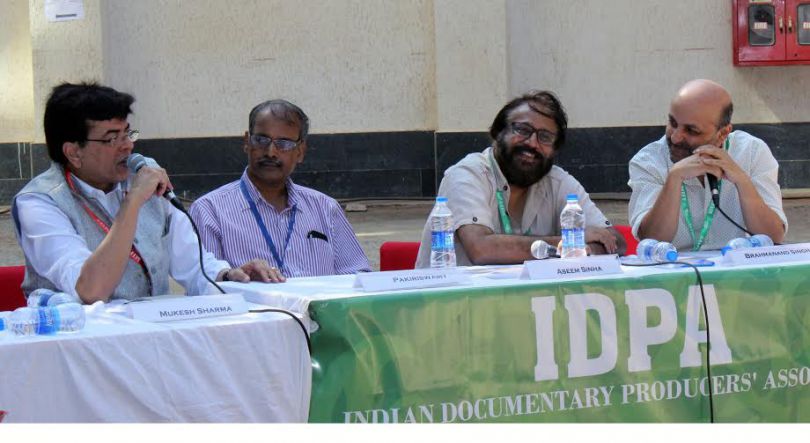|
|
||
|
Pro Tools
FILMFESTIVALS | 24/7 world wide coverageWelcome ! Enjoy the best of both worlds: Film & Festival News, exploring the best of the film festivals community. Launched in 1995, relentlessly connecting films to festivals, documenting and promoting festivals worldwide. Working on an upgrade soon. For collaboration, editorial contributions, or publicity, please send us an email here. User login |
MIFF 2016: Open Forum II--The travails of docu-makers
‘The challenge of filming documentaries in public places—legitimate documentary film-makers need to be distinguished from the feature film industry, press and media, and the passing tourist. What can be done to better establish documentaries as a separate genre of film and liberate its spirit from unnecessary obstruction; what incentives need to be provided for its growth?’ The second day’s Open Forum at the Mumbai International Film Festival (MIFF) addressed these broad issues, through its panelists, Mukesh Sharma (Director MIFF and Director General, Films Division), documentary-maker and editor Aseem Sinha (Well Done Abba, Ramchand Pakistani) and V. Packirisamy of the Films Division (FD), government of India, whose film Bhiwandi Tragedy won him Golden Conch for the best film at MIFF 1998. Independent documentary-maker Brahmanand Singh, maker of a much acclaimed feature length documentary on top-ranked Indian film music director, late Rahul Dev Burman, Pancham Unmixed, moderated. Sharma set the tone, by highlighting that there was a lot of content being generated in the documentaries, short and animation film fields, but content carriers were far short of requirements. With the advent of multiplexes, the monopolistic FD slots in single screen theatres have also been lost. But he was quite sure that once the under construction film heritage museum is ready, the FD complex will become a hub, and many screenings would take place here, quite regularly. As many as 2,000 viewers would be accommodated in one complex. Pointing out that struggling film-makers can hardly afford to deposit Rs. 60,000 for shooting $900, approx.), as is the prevalent law, Singh made a strong case for issuing identity cards to genuine documentary-makers, so that they would either be exempted from deposits and fees for outdoor shooting, or charged a considerably lower fee. Sharma responded by saying that such a facility could be misused by some cheats, but he nevertheless agreed to pursue the matter with the authorities of state of Maharashtra, who have been discussing this idea, at the behest of the Chief Minister. Packirisamy agreed that it was a problem for makers with tight budgets. He cited the example of a film-maker who had made a film within a budget of just Rs. 35,000, but he was asked to pay for censoring it a rate of Rs. 1,140 per reel (approximately 10 minutes, in 35 mm). Thus, mere certification of his film would cost him a fortune. Sinha lamented that committed docu-makers, who make serious films and not nach-gana (song and dance), were given amounts like Rs. 6-8-10 lakh (1 lakh=100,000) to produce the film. It takes a minimum of six months of a person’s life to complete the film. At the end of it all, how is he/she expected to survive on a few thousand rupees, which is all that he/she would save from the allotted funds? Moreover, one needs to pay Rs. 10,000-25,000 for empanelment on the list of various union ministries. An additional criterion for being chosen to get film projects is 3 years of experience. All these are deterrents that prevent talented, genuine docu-makers from getting assignments.
“No respectable should be expected to fit pre-defined budget-slots,” was the viewpoint of Mukesh Sharma. Although FD has fixed rates in place—Rs. 7 lakh for a 26-minute film and Rs. 13 lakh for a 52-minute film, Sharma felt that this should not be a rigid rule. As his mentor, the late V. Shantaram, once told him, “If you want to make Mughal-e-Azam, you will need to spend Rs. 30 crore (this was a long time ago; the amount would probably be around Rs. 300 crore in present times; a crore is 10 million). Coming back to the issue of carriers and platforms, Sharma had several locations to offer. “I hope to have screenings in four venues in Mumbai—FD’s own halls, All India Radio’s auditorium, Doordarshan’s hall and the Kalina campus of Mumbai University. In New Delhi, we will try and arrange screenings at the Mahadev Auditorium.” 04.02.2016 | Siraj Syed's blog Cat. : Ambiance
|
LinksThe Bulletin Board > The Bulletin Board Blog Following News Interview with IFTA Chairman (AFM)
Interview with Cannes Marche du Film Director
Filmfestivals.com dailies live coverage from > Live from India
Useful links for the indies: > Big files transfer
+ SUBSCRIBE to the weekly Newsletter Deals+ Special offers and discounts from filmfestivals.com Selected fun offers
> Bonus Casino
User imagesAbout Siraj Syed Syed Siraj Syed Siraj (Siraj Associates) Siraj Syed is a film-critic since 1970 and a Former President of the Freelance Film Journalists' Combine of India.He is the India Correspondent of FilmFestivals.com and a member of FIPRESCI, the international Federation of Film Critics, Munich, GermanySiraj Syed has contributed over 1,015 articles on cinema, international film festivals, conventions, exhibitions, etc., most recently, at IFFI (Goa), MIFF (Mumbai), MFF/MAMI (Mumbai) and CommunicAsia (Singapore). He often edits film festival daily bulletins.He is also an actor and a dubbing artiste. Further, he has been teaching media, acting and dubbing at over 30 institutes in India and Singapore, since 1984.View my profile Send me a message The EditorUser contributions |

















 MIFF 2016: Open Forum II--The travails of docu-makers
MIFF 2016: Open Forum II--The travails of docu-makers










